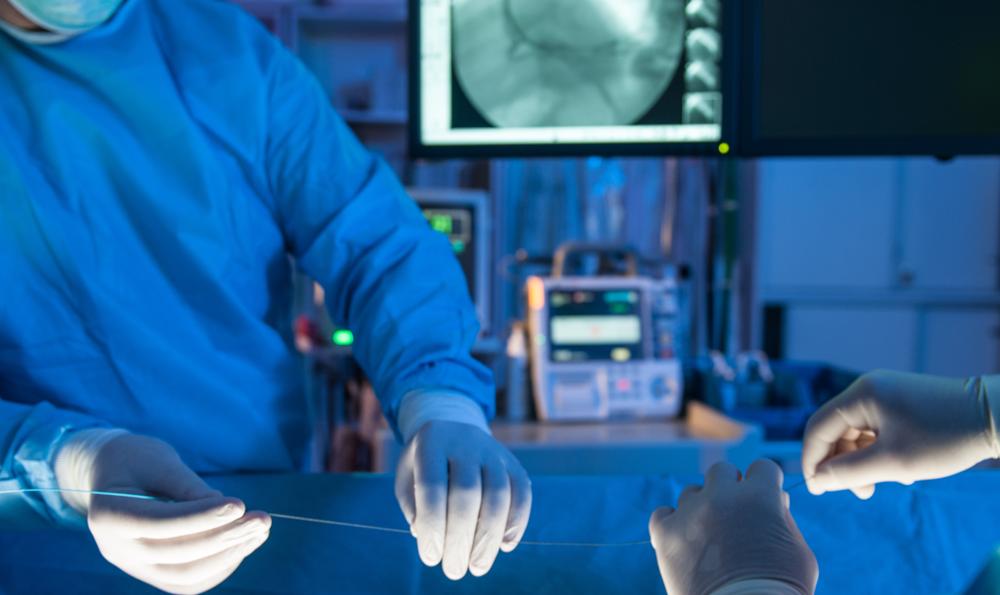Daniel Ventarola, MD, a vascular surgeon with Atlantic Health, had a patient with blocked arteries to her intestines. She was in pain, couldn’t eat and was losing weight, and she didn’t have the strength for an open bypass surgery.
In cases like these, vascular experts often play the role of quiet miracle makers. They use their knowledge of the vascular system, as well as ingenuity and advanced technology, to change, and in many cases, save people’s lives.
Dr. Ventarola guided a very small wire through the patient’s body, from the arm, around arteries in the abdomen, and out the leg. He then used a new procedure called intravascular lithotripsy (IVL). The procedure utilizes special balloons that use ultrasound waves to break up calcium, making stenting possible where it once was impossible.
“Someone who came in who was really looking at a large bypass operation with substantial risk left the hospital a few days later with a needle poke in the groin and a small two-centimeter incision in her arm,” Dr. Ventarola says. “She did great. She was a rockstar.”
More than 200 million people worldwide are affected by peripheral artery disease (PAD), a condition in which arteries narrow and reduce blood flow. Today, vascular surgeons combine new and traditional techniques to create customized treatment plans that provide better outcomes and get patients home faster.
What is vascular surgery?
Vascular surgery includes any procedure that involves blood vessels. These structures carry blood to tissues and organs throughout the body.
“Patients are referred to us for many reasons,” Dr. Ventarola says. “Sometimes they have pain when they walk or pain when they eat. They may have wounds on their legs which cannot heal due to lack of blood flow. They may have plaque in their neck and may have had stroke or can be at risk for one. Sometimes they experience leg swelling and have issues with their veins in their legs. We’re involved with all of that.”
Common conditions vascular surgeons treat include:
- Aortic aneurysms: A widening of the artery that carries blood from the heart to the body
- Atherosclerosis: Hardening of the arteries, occurring when plaque builds up
- Carotid artery disease: When the arteries that provide blood to your brain become narrow or blocked
- Deep vein thrombosis (DVT): Blood clots form in veins deep inside the body
- Kidney failure: A condition in which your kidneys can no longer remove waste and balance fluids
- Peripheral artery disease (PAD): Which results in narrowed arteries, reducing blood flow
- Varicose veins: Veins become enlarged, twisted and swollen
- Venous insufficiency: Veins struggle to send blood from the legs back to the heart
- Trauma: When an accident or injury damages arteries and veins
Vascular surgeons are equipped to perform minimally invasive endovascular procedures using wires and catheters, traditional open surgeries (which require an incision large enough to see and access the involved blood vessels) and a combination of both. Endovascular procedures and open surgeries each have their own strengths and weaknesses. Dr. Ventarola reviews each patient’s case carefully, harnessing the benefits of every new tool and technique available.
Take carotid endarterectomy, for example, a procedure that removes plaque from the carotid artery, which carries blood from the heart to the brain.
“Endarterectomy is an excellent option for many patients,” Dr. Ventarola says. “But in some circumstances, patients can benefit more from a newer technique that combines a simultaneous surgical-endovascular approach. This uses a small incision above the collarbone, where special catheters are used to place a stent in the artery, fixing the blockage. “This has very good results, combining the low stroke risk of carotid endarterectomy with the minimal invasiveness of carotid stenting.”
Life-saving interventions
Vascular surgeons are both involved in emergency care, including treatment of ruptured aneurysms and sudden loss of blood to arms and legs, as well as preventive care, including screenings and elective repairs before catastrophic events. They can restore blood flow to save limbs and prevent amputations.
Today, many of these interventions are safer, faster and require less recovery time compared to traditional techniques. Aortic aneurysm repair is a good example of this. Advances in stent technology now allow a substantial number of patients to be treated using modular stents that can be customized to treat more and more patients in a minimally invasive fashion.
“The technology for minimally invasive treatment of vascular disease in the legs is also getting better,” Dr. Ventarola says. “We can now really push the envelope on treating patients who are sicker with less downtime and less operative morbidity than ever before. Often, patients are even treated on an outpatient basis. That said, sometimes, the best option truly is an open operation, but we can combine this with newer techniques to really leverage the strengths of both techniques for the best outcome and fastest recovery for the patient.”
New vascular surgery developments and techniques
“It’s a burgeoning field and there are always new developments, new techniques and new devices,” Dr. Ventarola says. “We don’t forget the old, but we embrace the new. Vascular surgery is unique in that we constantly have new developments. So, we’re always able to approach things a little differently and always a little better. And that’s great.”












